Optimal by JM Berger
“The truth is that reality is negotiated by consensus.” —Stanton Lime, in Optimal
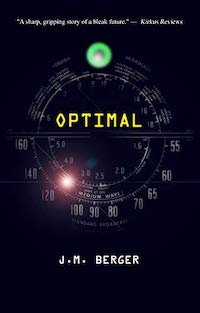 For most of us, our lives are deeply entangled with our digital devices, especially our smartphones. Through text messages, social media, and email, our phones keep us connected to our social circles. Engage the right apps, and they can warn us of potential assaults on our personal accounts, nudge us awake in the morning, help us track what we eat during the day, encourage exercise if we’ve been sitting too long, recommend a running route–or a restaurant–and ensure we don’t forget about that critical meeting or a spouse’s birthday. Algorithms, and the prompts they generate, encourage us to act and interact. Some apps offer token rewards or praise for good behavior, others urge us to rate every place we visit. Our responses are observed, our behavior logged, and our preferences deciphered so that we can be presented with ever more customized options, offers, and personally tailored stories ranging from news to entertainment.
For most of us, our lives are deeply entangled with our digital devices, especially our smartphones. Through text messages, social media, and email, our phones keep us connected to our social circles. Engage the right apps, and they can warn us of potential assaults on our personal accounts, nudge us awake in the morning, help us track what we eat during the day, encourage exercise if we’ve been sitting too long, recommend a running route–or a restaurant–and ensure we don’t forget about that critical meeting or a spouse’s birthday. Algorithms, and the prompts they generate, encourage us to act and interact. Some apps offer token rewards or praise for good behavior, others urge us to rate every place we visit. Our responses are observed, our behavior logged, and our preferences deciphered so that we can be presented with ever more customized options, offers, and personally tailored stories ranging from news to entertainment.
It’s a platform that relies on surveillance, feedback, and manipulation. The system is complex, but clumsy and disjointed too, making it vulnerable to bad actors. Alongside the activity of benign self-improvement apps and consumer-analysis bots, political factions wage propaganda wars, seeking to control what people perceive as “reality,” while inducing social antagonisms, illogical behavior, and ultimately, violence in the tangible world.
But what if cyberspace could be transformed into a unitary system–one not ruled by any human master afflicted with inevitable quirks and inherent bigotry, but overseen instead by a benign AI-based information dictatorship? Imagine an AI designed and trained to perfect the task of guiding us through each day, and shaping our perception of reality with the goal of optimizing both our lives, and the world we live in.
That’s the premise behind JM Berger’s debut novel, Optimal.
The future portrayed in Optimal has gone far beyond smartphones. It’s a world of ubiquitous surveillance, with every room, every building, every road, every vehicle, every individual around the globe continuously linked, via an array of sensors, into an advanced artificial intelligence known simply as the System.
The System sees through the eyes of every citizen, it detects their every physiological quirk–but this isn’t sinister. The System’s algorithms are only seeking to optimize day-to-day life for everyone. In the quasi-utopia of the city, happy citizens are guided through each day by friendly prompts that urge them to wake on time, to exercise, to take designated paths to work, to work well, and to eat at suggested restaurants where favorite drinks and appetizers await at an open table as they walk in the door–because the System knows each person so well, it can order for them. No decision-making required. There’s no need to worry about finances either. The System tracks personal funds, while prompting each citizen to live within their means.
No one thinks to object to the constant guidance. Why should they? With the System’s algorithms piloting every individual throughout each day, conflict has been eliminated, poverty is unknown, and everyone has plenty of time to hang out with their friends, or check into Social, or to explore the trusted information contained in Knowledge.
This is a different kind of human/machine teaming than we’re used to seeing. In Optimal, humanity has ceded authority to the System, and by doing so, has finally achieved global peace.
And yet Jack–an average guy who works as an accountant–isn’t quite happy. He feels unfulfilled, both in his relationships and in his working life. Jack flirts with the idea of ignoring his prompts, making his own decisions, finding a new lover and a new career. But surely the System knows what’s best for him?
And then, inexplicably, the System assigns Jack a new task, a very unusual task. Stanton Lime, the chief financial officer of a client corporation, has vanished and Jack is asked to determine whether or not the missing man has made off with corporate funds. Jack soon settles that issue, but the real mystery remains: With every aspect of society observed and recorded, how could anyone disappear?
Jack sets out to answer that question, but every discovery only expands the mystery, leading him to question how the System works, what its real purpose is, and what kind of society it has designed, given its task of keeping the peace.
As Jack’s perception of his world evolves, he’s no longer content with the pablum of constant input the System feeds into his eyes and ears:
He muted as many of the flags and notifications as possible, although they still danced around the periphery of his awareness as new information flowed in and piled up, waiting expectantly for his attention. Even the muted content seemed to press at him intangibly, like the effect of gravity on tides. A world of information just waiting until the mute expired, eagerly counting the seconds until its opportunity to pounce.
He wanted to scream, SHUT UP. How do you expect me to think?
But of course, no one expected him to think.
Jack is not alone in his quest to find the mysterious Stanton Lime. He has the help of friends, and of discontented corporate officer Megumi.
But coercion comes in many forms, and along the way he learns that the System has trained others to accept a very different version of reality. One such individual, in a poignant description of her early life, tells Jack:
What surrounds you defines you, defines your expectations, your perception of what is real and what is possible. It creates boundaries, walls of concrete, that have to be actively smashed, fought tooth and nail, even when you are small, even if your heart by its very nature is filled with color.
Jack is learning to smash those walls, to fight that fight, always wondering just how far he will be allowed to go.
Artificial intelligence, and our electronic assistants, can surely help to optimize our lives. But our entanglement with the digital world leaves us vulnerable to deception and manipulation–and more and more, it exposes us to the unexpected solutions sometimes reached through the opaque, inhuman calculations of artificial intelligence. Optimal is a brilliant exploration of the implications of ceding our personal responsibility and relying on algorithms to teach us how to live.
But more than that, it’s great storytelling.
Highly recommended. Optimal is available at Amazon. (paid link)








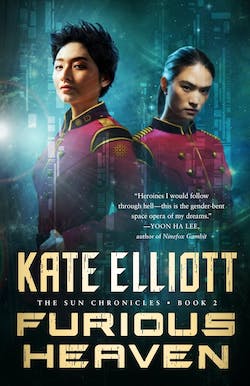 I so admire the way Kate Elliott can imagine such a diversity of scenes and cultures, imbuing them with all the detail to make them feel real, while not bogging down the story with needlessly extended descriptions. But much more than that, her ability to create a wide variety of characters with complex internal lives is so impressive to me — and to do this in a wide-ranging novel that plays out on multiple stages from many points of view . . . well, simply put, this series deserves far more attention than it looks to have garnered so far.
I so admire the way Kate Elliott can imagine such a diversity of scenes and cultures, imbuing them with all the detail to make them feel real, while not bogging down the story with needlessly extended descriptions. But much more than that, her ability to create a wide variety of characters with complex internal lives is so impressive to me — and to do this in a wide-ranging novel that plays out on multiple stages from many points of view . . . well, simply put, this series deserves far more attention than it looks to have garnered so far. 
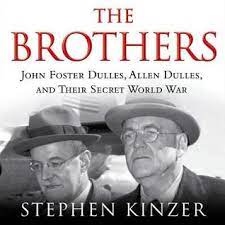 Audible has a lot of two-books-for-one-credit sales. These sales are always limited to a select list of titles, a circumstance that has the effect of encouraging me to pick up audiobooks I otherwise would never have thought to try. That’s how I happened to come across The Brothers.
Audible has a lot of two-books-for-one-credit sales. These sales are always limited to a select list of titles, a circumstance that has the effect of encouraging me to pick up audiobooks I otherwise would never have thought to try. That’s how I happened to come across The Brothers.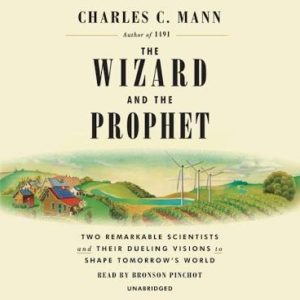
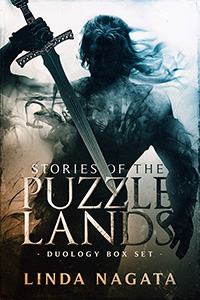

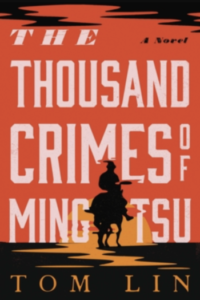
 In the 1980s and early 1990s, the only way for me to find new science fiction was to visit the little Waldenbooks at Maui Mall. Two short shelves held the full selection of mass-market paperbacks—the only format I could afford. It took only a few minutes to peruse the titles. Very often, I came away with something excellent to read. One of those lucky finds was a novel called The Broken God by David Zindell. I loved this book enough to go on to read the rest of the trilogy. Sometime later, I happened to be talking to a friend when the subject of David Zindell’s work came up.
In the 1980s and early 1990s, the only way for me to find new science fiction was to visit the little Waldenbooks at Maui Mall. Two short shelves held the full selection of mass-market paperbacks—the only format I could afford. It took only a few minutes to peruse the titles. Very often, I came away with something excellent to read. One of those lucky finds was a novel called The Broken God by David Zindell. I loved this book enough to go on to read the rest of the trilogy. Sometime later, I happened to be talking to a friend when the subject of David Zindell’s work came up.
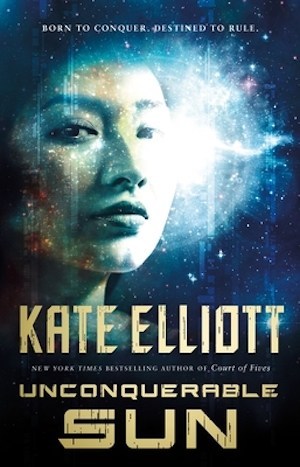 Most readers, and writers too, have quirks when it comes to what they like, and I’m no exception. There are certain popular space opera tropes I tend not to favor:
Most readers, and writers too, have quirks when it comes to what they like, and I’m no exception. There are certain popular space opera tropes I tend not to favor: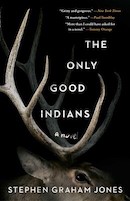 I almost never read horror. It’s just not my thing. But Stephen Graham Jones’s new novel The Only Good Indians received such excellent reviews that I couldn’t resist, and preordered it. It’s the story of four Blackfeet friends who grew up together and now find themselves paying in a shocking way for an incident that took place in their youth. It’s an engrossing story, with excellent characterizations.
I almost never read horror. It’s just not my thing. But Stephen Graham Jones’s new novel The Only Good Indians received such excellent reviews that I couldn’t resist, and preordered it. It’s the story of four Blackfeet friends who grew up together and now find themselves paying in a shocking way for an incident that took place in their youth. It’s an engrossing story, with excellent characterizations.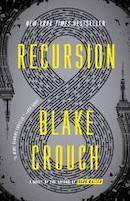 I also recommend Recursion, by Blake Crouch — a time-travel story with a unique-to-me twist. When someone goes back in time and changes the future, the original future is not lost, but continues to exist as “dead memories” in the minds of those affected by the change –memories that are less than real but not forgotten. Recursion starts off feeling like a standard thriller, but along the way it evolves into a complex, thoughtful, and fascinating read.
I also recommend Recursion, by Blake Crouch — a time-travel story with a unique-to-me twist. When someone goes back in time and changes the future, the original future is not lost, but continues to exist as “dead memories” in the minds of those affected by the change –memories that are less than real but not forgotten. Recursion starts off feeling like a standard thriller, but along the way it evolves into a complex, thoughtful, and fascinating read.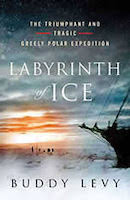 And for audiobook fans…
And for audiobook fans…